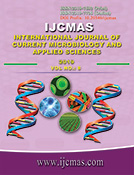


 National Academy of Agricultural Sciences (NAAS)
National Academy of Agricultural Sciences (NAAS)

|
PRINT ISSN : 2319-7692
Online ISSN : 2319-7706 Issues : 12 per year Publisher : Excellent Publishers Email : editorijcmas@gmail.com / submit@ijcmas.com Editor-in-chief: Dr.M.Prakash Index Copernicus ICV 2018: 95.39 NAAS RATING 2020: 5.38 |
A laboratory study was conducted to assess the efficacy of the different microbes to solubilise nano rock phosphate. Nano rock phosphate was prepared using a 24 blade FRITSCH Rotar Mill (Model-Pulverizette-14) with a 80µm sieve, followed by high energy ball milling. The nano rock phosphate particles were characterized by Transmission electron microscopy (TEM), Field Emission Scanning Electron Microscopy (FESEM), Dynamic Light Scattering (DLS) and X-Ray Diffraction (XRD) analysis regarding their size, shape, morphology, structure and composition. The pure culture of fungi and bacteria were isolated form Bhanpur dumping site, Bhopal, India. The fungal and bacterial isolates were screened on the basis of their phosphate solubilisation potential. The dominant phosphate solubilising strains were Bacillus amyloliquefaciens, Aspergillus flavus and Aspergillus terrus. The quantitative study of phosphate solubilisation form nano rock phosphate was done with the positive strains. Results revealed that Aspergillus flavus and Aspergillus terrus were able to solubilize the nanorock phosphate particles more efficiently (2.87-18.16% more) than the tri -calcium phosphate particles as compared to bacteria. Solubilization of nano rock phosphate was the result of organic acid produced by microbes. The study reflected the potential of nano rock phosphate as a P supplying source along with P solubilising microbes. As to date, there is very meager report on microbial solubilisation of phosphorus from nano rock phosphate; the present investigation therefore has highlighted the scope for future research.
 |
 |
 |
 |
 |